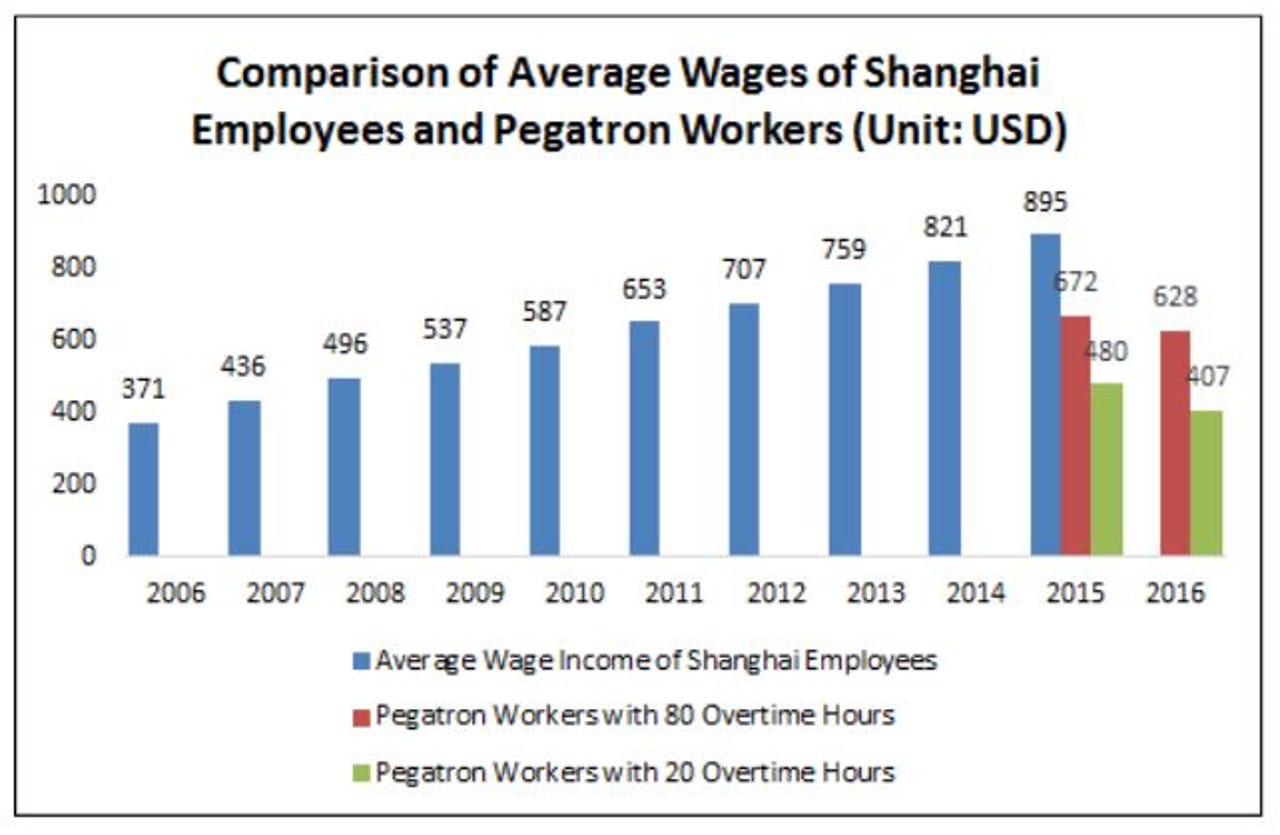Pegatron is exploiting workers making Apple iPhone 7 in China - report


China Labor Watch has skewered Apple over worker exploitation in the manufacture of iPhones in China (PDF). This is not the first time that Apple been has attacked for working practices at some of its suppliers, following a furore about suicides and riots at a Foxconn plant manufacturing Apple products in 2010. Some abuses were exposed in a damning New York Times investigation, and by a BBC Panorama documentary filmed using undercover workers.
Media coverage led to pay rises and improved working conditions at Foxconn. Apple responded by moving some manufacturing to Pegatron, which offered Apple lower prices based on lower wages.
It's not as though Apple really needs to screw its Chinese workers, since the company has more than $200 billion in cash. According to China Labor Watch, in 2105, Apple made twice as much profit in China ($13.4 billion) as it paid its 1.6 million Chinese workers ($6.2 billion).
Further, China Labor Watch reckons that the total annual basic wages of 50,000 Pegatron workers was around $193 million US dollars in 2015. This compares with Tim Cook's $378 million pay package on taking the top job at Apple, and the $73 million deal given to Angela Ahrendts when she joined from Burberry.
In researching Pegatron, China Labor Watch collected more than 2,000 pay slips of production line and maintenance workers. Almost all were earning the legal minimum wage, which was $304 per month before April 2016, and rose to $330 in May. This is not enough to live on in the Shanghai area, so workers depend heavily on overtime.
In an investigation in February, China Labor Watch found that 71.1 percent of Pegatron's production line employees were working more than 60 hours of overtime and 64 percent of them worked more than 90 hours of overtime in that month. This violates Apple's guidelines, and appears to be illegal.
Worse, although Shanghai's municipal government raised the minimum wage from $304 to $330, and Pegatron bumped that up to $350, Pegatron's workers ended up worse off. This was because Pegatron reduced bonus payments, and stopped paying workers' social insurance payments in full. This resulted in "a $110 decrease in real wage, despite the wage raise. For this reason, many workers felt they were cheated," says China Labor Watch.
In 2015, the average wage of Shanghai workers was $895. Pegatron workers who did 80 hours of overtime got $672, and those who did 20 hours of overtime got $490, according to China Labor Watch. In 2016, the totals fell to $628 and $407. A worker who did no overtime would net about $213, after deductions.
China Labor Watch claims that 42.3 percent of Pegatron workers' basic wages were below Shanghai's legal minimum wage, and Pegatron had to add an average of $19 to make up the difference.
China Labor Watch also accuses Pegatron of breaking the law in its treatment of interns. The government says they cannot be asked to work overtime, but on average, Pegatron's interns worked more overtime than full-time employees.
Interns are not workers, they are students, often aged 17-18. They are not supposed to be working on production lines that have nothing to do with their studies. They're not volunteering either: they are little more than slave labour.
This should not be news to Apple, which must know that Foxconn formerly used a lot of interns.
Apple's big-bang approach to marketing requires large numbers of workers to meet peak demand, and ideally these workers should be easy to dispose of afterwards. Foxconn explained in 2012 that it was hard to hire 20 percent more workers all at once. If you had a million workers, you needed 200,000 extra. Bussing interns in from vocational secondary schools was a quick way to solve that problem, and this approach was facilitated by the Chinese government and its education system.
Apple apologists will, of course, protest that "they all do it". However, there are other considerations.
First, Apple's marketing practices put massive amounts of strain on Chinese workers, who are put under intense pressure to make vast quantities of new iPhones for Apple's high-profile launches. The volumes are much larger than for other smartphone suppliers, who generally offer much wider ranges of products, creating far less stress.
Second, China Labor Watch's executive director Li Qiang points out that: "In 2015, Apple alone claimed more than 90 percent of the smartphone industry's aggregate profits, while a majority of other firms were operating at a loss."
It would be ridiculous to expect rival smartphone suppliers to treat workers better than Apple's subcontractors when Apple is making huge profits and they're fighting for survival.
If Tim Cook looked in his heart instead of at Apple's growing cash mountain, he would know that Apple could lead by example in giving his Chinese workers a better deal. A living wage for a 60-hour week would be a start.
Apple, as the world's richest corporation, can hardly pretend to be a force for good when most of the people making its products at Pegatron are putting in more than 80 hours of overtime per month to make enough to live on.
That vocation school students are often unwillingly, and illegally, working similar hours is a disgrace.
Tim Cook has said: "We care about every worker in our worldwide supply chain."
This just sounds sanctimonious because the exploitation of workers making Apple products goes back at least a decade. How many decades does Apple need before it finally takes its problems seriously?